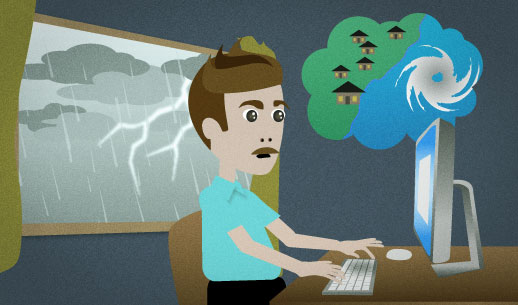“Some folks are evacuating, but I'm staying put.”
There's a hurricane coming towards your location. The news suggested that people in your area should leave, but you don't want to. You think you'll be OK in your home. You write your decision like this to your friends on Facebook.
Some folks are evacuating, but I'm staying put.
Want Video and Sound? Follow us on YouTube

some folks
"Folks" means "people". It's a casual phrase, used especially by older people and people from the country. These days, politicians also use it because it makes them sound simple and friendly.
evacuate (a place)
To "evacuate ___" means to leave a place quickly because of a disaster or emergency. Some examples are:
- You might have to evacuate your home if there's a hurricane, flood, or other natural disaster.
- People "evacuate" a building when it's on fire.
- In science fiction movies and TV shows, the people on a space ship sometimes have to evacuate if their ship is attacked.
You can use the word "evacuate" with an object after it like this:
All residents within a 5-kilometer radius have been instructed to evacuate their homes.
Or you can avoid putting something after "evacuate":
All residents within a 5-kilometer radius have been instructed to evacuate.
I'm (doing something)
You can say "I'm ___ing" to talk about either the present or the future.
In this example:
We're going to my in-laws' house this weekend.
...the speaker is talking about the future. This is a plan which they have already made.
In this example, the person is talking about something that is happening right now:
I'm watching the news.
You have to pay attention to the situation to figure out whether someone is talking about the present or the future.
stay put
To "stay put" means to stay somewhere, without moving. It's a casual phrase.
You can tell your children to "stay put" if you don't want them to go anywhere. For example, if you take them shopping and need to go into the dressing room to try on a shirt, you can tell them:
Stay put. I'll be back in a minute.
